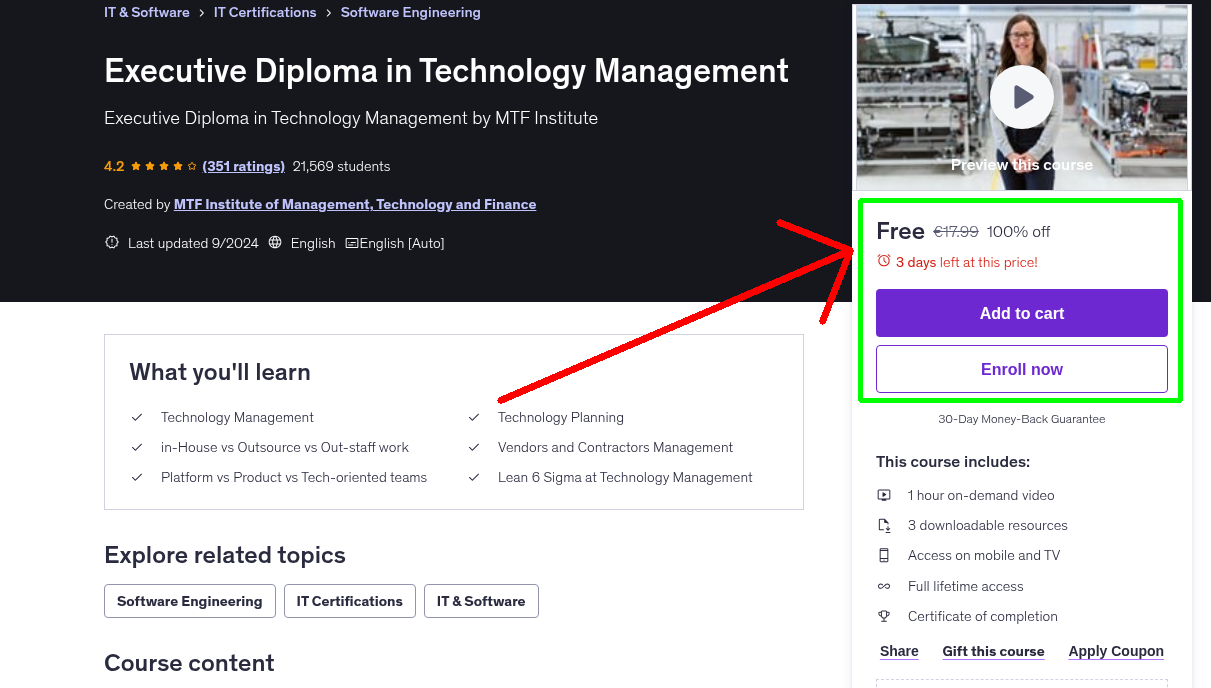
What You'll Learn
- Technology Management
- Technology Planning
- in-House vs Outsource vs Out-staff work
- Vendors and Contractors Management
- Platform vs Product vs Tech-oriented teams
- Lean 6 Sigma at Technology Management
Requirements
- For a better learning experience, we suggest you to use a laptop / mobile phone / pen and paper for taking notes, highlighting important points, and making summaries to reinforce your learning.
Who This Course is For
- No special requirements. Course for any who want to build a career as CIO/CTO or improve their knowledge.
- Role and Key Functionality of CIO (Chief Information Officer) and CTO (Chief Technology Officer): Chief Information Officer (CIO): The CIO is a key executive responsible for managing and implementing information technology (IT) strategies within an organization. Their role revolves around aligning IT systems with the overall business objectives. Key functionalities of a CIO include: IT Strategy Development: The CIO formulates and executes IT strategies that align with the company's goals, ensuring that technology supports and enhances business operations Information Security: CIOs are responsible for safeguarding the organization's digital assets and ensuring data privacy and compliance with relevant regulations Infrastructure Management: They oversee the design, implementation, and maintenance of IT infrastructure, including hardware, software, and networks Vendor Management: CIOs often engage with technology vendors to procure solutions, negotiate contracts, and ensure the delivery of high-quality services
- Chief Technology Officer (CTO): The CTO, on the other hand, focuses on the technological aspects of the business, ensuring that the company stays at the forefront of industry trends and innovations. Key functionalities of a CTO include: Technology Innovation: The CTO is responsible for driving technological innovation within the organization, exploring emerging technologies, and recommending their adoption where relevant Product Development: CTOs often play a crucial role in the development of new products and services, leveraging technology to create innovative solutions that meet customer needs Research and Development: CTOs lead research efforts to stay abreast of industry advancements, fostering a culture of continuous learning and technological evolution within the company Technical Leadership: CTOs provide technical leadership to development teams, ensuring that projects are aligned with the company's strategic goals and technological vision
- Why Technology Management is the Foundation of their Work: Technology management is the foundation of the work of CIOs and CTOs because it enables organizations to harness the power of technology to achieve their business objectives. Effective technology management involves: Strategic Alignment: Ensuring that technology initiatives are aligned with the overall business strategy, allowing organizations to leverage technology as a strategic enabler Risk Management: Identifying and mitigating potential risks associated with technology, including cybersecurity threats, data breaches, and system failures
- Innovation: Fostering a culture of innovation by staying informed about emerging technologies and strategically incorporating them to gain a competitive edge Resource Optimization: Efficiently managing IT resources, including budgets, infrastructure, and personnel, to maximize the return on investment in technology.
- Importance of Learning Technology Management for Companies and Experts: Strategic Decision-Making: Understanding technology management equips leaders with the knowledge to make informed decisions about technology investments, aligning them with organizational goals Competitive Advantage: Companies that effectively manage technology gain a competitive advantage by leveraging innovations to improve efficiency, customer experience, and product offerings Adaptability: Learning technology management helps organizations adapt to the rapidly changing technological landscape, ensuring they stay relevant and resilient in the face of disruption Risk Mitigation: Technology management knowledge enables proactive identification and mitigation of risks, safeguarding organizations against potential threats to their IT infrastructure and data
- How Learning Technology Management Supports Career Growth: Leadership Opportunities: Proficiency in technology management positions individuals for leadership roles, such as CIO or CTO, where they can shape the technological direction of an organization. Problem-Solving Skills: Technology management education enhances problem-solving skills, enabling professionals to address complex technological challenges within their roles. Innovation and Creativity: Understanding technology management fosters innovation and creativity, allowing individuals to contribute to the development of novel solutions and approaches within their fields. Cross-Functional Collaboration: Technology management knowledge facilitates effective collaboration between technical and non-technical teams, breaking down silos and promoting a holistic understanding of business goals. Learning about technology management is essential for both companies and individuals, providing a solid foundation for strategic decision-making, innovation, and long-term success in the ever-evolving landscape of technology and business.
Your Instructor
MTF Institute of Management, Technology and Finance
Institute of Management, Technology and Finance
4.4 Instructor Rating
100,250 Reviews
961,984 Students
274 Courses
Never Miss a Coupon!
Subscribe to our newsletter to get daily updates on the latest free courses.



